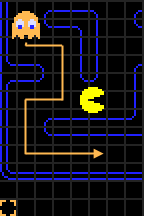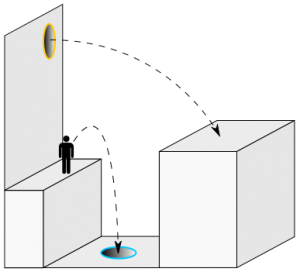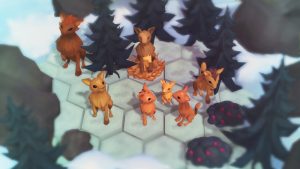What makes a good educational game?
Posted on Sun 07 May 2017 in Gamedev
As I mentioned at the start of this blog, in the future I want to focus on creating educational games. The term 'educational game' means different things to different people, and it's also somewhat of a buzzword nowadays. Here I want to explain what 'educational' means to me. What type of educational game would I like to make? I'll try to answer that by comparing with a few examples.
Is Pacman a good educational game?
As a counter-example, let's start with a well-known game that is not usually considered very educational. Pacman. If you think about it, there are many skills to be learned from playing Pacman. Timing and reaction speed. Hand-eye coordination. Basic spatial thinking. Pattern recognition. Each of the four ghosts moves according to predefined patterns, and recognizing those patterns is the key to mastering this old classic.

According to the book 'a theory of fun for game design', humans play games to learn. Playing behavior arose during evolution so that we could practice life skills in a safe setting. Each time you escape a ghost or eat a power pill, you are preparing for an encounter with a lion on the prehistoric savannah. You learn, and your brain rewards you with a puff of endorphins. We call this fun, but really, biologically speaking it's indistinguishable from learning.
So all games are educational in some way. The only problem is that many action games teach paleolithic skills. Reaction speed. Battle tactics. Aiming a weapon. Territorial dominance. We still get the fun from learning, but what we learn does not prepare us much better for life in the 21st century. Gaming is a waste of time, not because we don't learn from it, but because we learn mostly outdated skills.
Is Portal a good educational game?
Yesterday at the Amsterdam game developer meetup, we discussed educational games. Portal, the 3D puzzle game with mind-bending physics, came up as an example of an educational game. One of the puzzle-mechanics in this game is conservation of momentum. Apparently Portal has been used in a classroom setting, to teach this physics principle to students.

I don't think Portal is the kind of educational game I would like to make. To me, there are two problems with it:
First, conservation of momentum is only a small part of the game. Yes, there are a few puzzles that are incredibly hard to solve if you don't apply this concept properly. But if you want to teach, then the other 90% of the game gets in the way a lot. Portal was never designed as an educational game. It was designed as a fun puzzle game that coincidentally happens to use a few classroom physics concepts.
Secondly, it's a very limited use of the endless possibilities of games. Conservation of momentum means: an object in motion stays in motion until a force is applied to it. This is a concept close to daily experience, almost intuitively understandable. There is no need for expensive optical equipment to study it. There is no need to take the class on a field trip to a distant museum. Just a soccer ball is enough to demonstrate it. All the tools needed to make the concept insightful are already at the teachers disposal.
And we can do so much more than that! Games allow us to open up entirely new virtual worlds where we can shrink to microscopic size and move through the human body (biology), walk around in ancient Rome (history), simulate entire cities (geography).
That is not to say that teaching through games isn't a great way to liven up a boring classroom. But then you're reducing the gaming aspect to just a gimmick, a psychological trick to maintain attention. When I was in high school, in English class we were rewarded with five minutes of watching Mr. Bean at the end if we paid attention the rest of the time (I suppose the intention was to convey English culture, because Mr. Bean doesn't convey much of the English language). There is nothing wrong with this approach per se, but it's a relatively poor use of the possibilities of games, and not the type of educational game I want to aim for.
Niche
Let's get to one of my favorite educational games of this moment: Niche.

In Niche you control a group of fictional mammals, and by properly selecting pairs of animals to breed, you can slowly improve the fitness of the population: stronger claws, better hearing and eyesight, better resistance to heat or cold. You make your group more resistant to predators and the environment. The more you play, the more you learn about genetics. The more you learn about genetics, the better you get at the game.
Niche teaches concepts from population genetics without being explicit, without being too teach-y. The students are just playing a fun game where you have to protect your tribe of cute furry animals. Slowly, as you get better at playing the game, you start to recognize the game mechanics. These happen to work by simulating real-life biological concepts. By getting good at the game, you slowly develop intuition for genetic principles, such as phenotype and genotype, recessive and dominant alleles, mutations, disease resistance, incest and inbreeding, natural and artificial selection, survival of the fittest.
Not only that, but it is plain fun to play! Don't take my opinion for it, just take a look at the reception on Youtube. Both fun and educational, what more could you want?
Future work
In short, my "sekrit project", my future educational game should have these features:
- It is fun to play and not overly pedagogic.
- It teaches advanced modern concepts that go beyond the reaction speed, the fighting and territorial dominance of action games.
- And it makes use of the possibility of virtual worlds to visualize hard concepts, to take something that is not intuitive, that is remote from everyday experience and find a way to experience it.
By the way, I'm always looking for interesting examples of educational games. Know another good one? Leave a comment!